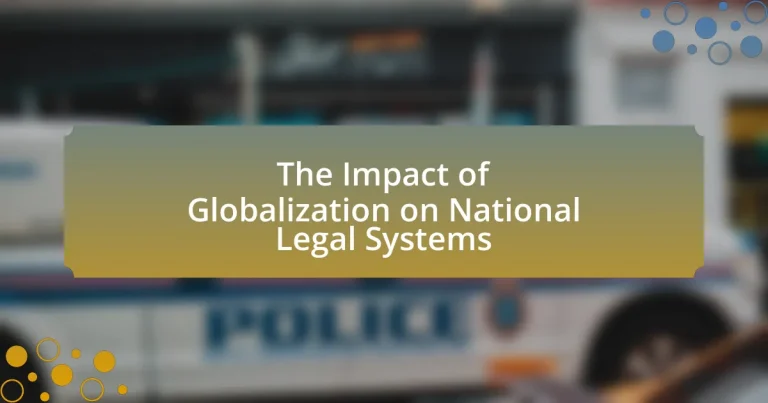The article examines the impact of globalization on national legal systems, highlighting how it promotes the harmonization of laws across borders. It discusses the influence of international treaties and agreements, the role of multinational corporations, and the adaptation of legal frameworks to align with global standards. Key elements affected include legal predictability, sovereignty, and the enforcement of laws, as globalization necessitates countries to revise their domestic laws to comply with international norms. The article also explores future trends, such as the rise of digital law and the importance of balancing globalization with the preservation of local legal traditions.

What is the Impact of Globalization on National Legal Systems?
Globalization significantly impacts national legal systems by promoting the harmonization of laws across borders. This process occurs as countries adapt their legal frameworks to facilitate international trade, investment, and cooperation, leading to the adoption of similar regulations and standards. For instance, the proliferation of international treaties and agreements, such as the World Trade Organization’s regulations, compels nations to align their domestic laws with global norms, thereby reducing legal discrepancies. Additionally, globalization fosters the influence of transnational legal principles, which can override or reshape national laws, as seen in areas like human rights and environmental regulations. This convergence can enhance legal predictability and stability but may also challenge national sovereignty and local legal traditions.
How does globalization influence the development of national legal frameworks?
Globalization significantly influences the development of national legal frameworks by promoting the harmonization of laws across borders. This occurs as countries adapt their legal systems to facilitate international trade, investment, and cooperation, often leading to the adoption of similar regulations and standards. For instance, the World Trade Organization (WTO) encourages member states to align their trade laws with international agreements, resulting in a convergence of legal practices. Additionally, globalization fosters the exchange of legal ideas and practices through transnational networks, which can lead to reforms in domestic laws to meet global standards, such as those related to human rights and environmental protection. This dynamic illustrates how globalization acts as a catalyst for legal evolution within national contexts.
What are the key elements of national legal systems affected by globalization?
The key elements of national legal systems affected by globalization include the harmonization of laws, the influence of international treaties, the role of transnational corporations, and the adaptation of legal frameworks to accommodate global standards. Harmonization of laws occurs as countries align their regulations to facilitate international trade and investment, exemplified by agreements like the World Trade Organization’s Trade-Related Aspects of Intellectual Property Rights (TRIPS). International treaties, such as the United Nations Convention on Contracts for the International Sale of Goods (CISG), shape domestic laws by providing common legal standards. The influence of transnational corporations often leads to the adoption of business-friendly regulations, impacting labor laws and environmental standards. Additionally, national legal systems increasingly adapt to global standards, such as those set by the International Organization for Standardization (ISO), to remain competitive in the global market. These elements illustrate how globalization reshapes national legal frameworks, promoting interconnectedness and compliance with international norms.
How do international treaties and agreements shape national laws?
International treaties and agreements shape national laws by establishing binding obligations that countries must incorporate into their domestic legal frameworks. When a nation ratifies a treaty, it commits to aligning its laws with the treaty’s provisions, which can lead to significant legal reforms. For example, the Convention on the Rights of the Child requires signatory countries to adopt laws that protect children’s rights, prompting many nations to revise their legal systems to comply with international standards. This process often involves legislative changes, judicial interpretations, and administrative adjustments to ensure conformity with the treaty’s requirements.
Why is understanding the impact of globalization on legal systems important?
Understanding the impact of globalization on legal systems is important because it influences the development and adaptation of laws in response to international norms and practices. Globalization leads to increased cross-border interactions, necessitating legal frameworks that can accommodate diverse legal traditions and regulatory standards. For instance, the harmonization of laws in trade agreements, such as the World Trade Organization’s regulations, illustrates how globalization shapes national legal systems to promote consistency and cooperation among countries. This understanding is crucial for policymakers and legal practitioners to navigate the complexities of international law and ensure that domestic laws remain relevant and effective in a globalized context.
What are the implications for sovereignty and legal autonomy?
Globalization significantly impacts sovereignty and legal autonomy by diminishing the control that nation-states have over their legal frameworks. As countries engage in international trade and treaties, they often adopt foreign laws and standards, which can lead to a loss of legislative independence. For instance, the adoption of international human rights norms can compel states to alter their domestic laws, thereby constraining their legal autonomy. Additionally, multinational corporations may influence national regulations, further eroding sovereignty as states prioritize economic interests over local legal traditions. This trend is evident in the European Union, where member states cede certain legal powers to supranational institutions, illustrating the complex interplay between globalization and national legal systems.
How does globalization affect the enforcement of laws within nations?
Globalization affects the enforcement of laws within nations by creating a complex interplay between domestic legal systems and international norms. As countries become more interconnected through trade, technology, and communication, they often face pressure to harmonize their laws with international standards, which can lead to challenges in enforcing local regulations. For instance, multinational corporations may exploit legal loopholes across jurisdictions, undermining national laws. A study by the World Bank indicates that countries with higher levels of globalization tend to adopt more international treaties, which can dilute the effectiveness of local law enforcement. This dynamic illustrates how globalization can both enhance and complicate the enforcement of laws within nations.

What are the specific effects of globalization on national legal systems?
Globalization significantly affects national legal systems by promoting the harmonization of laws across borders, leading to increased legal uniformity. This process occurs as countries adopt international treaties and conventions, such as the United Nations Convention on Contracts for the International Sale of Goods, which standardizes commercial laws. Additionally, globalization encourages the influence of transnational legal norms, compelling national legal systems to adapt to international human rights standards, as seen in the incorporation of principles from the Universal Declaration of Human Rights into domestic laws. Furthermore, globalization facilitates the rise of international arbitration and dispute resolution mechanisms, which often supersede national courts, thereby altering the traditional jurisdictional authority of national legal systems.
How does globalization lead to legal harmonization across countries?
Globalization leads to legal harmonization across countries by fostering interconnectedness that necessitates uniform legal standards. As countries engage in international trade and investment, they encounter varying legal frameworks that can create barriers. To facilitate smoother transactions and cooperation, nations often adopt similar laws and regulations, particularly in areas like trade, intellectual property, and environmental standards. For instance, the World Trade Organization (WTO) promotes agreements that encourage member countries to align their trade laws, resulting in a more cohesive legal landscape. This trend is further supported by multinational corporations that advocate for consistent regulations to streamline their operations across borders, reinforcing the push towards legal harmonization.
What are the benefits and challenges of legal harmonization?
Legal harmonization offers benefits such as increased legal certainty and reduced transaction costs across jurisdictions, facilitating international trade and cooperation. By standardizing laws, businesses can operate more efficiently in multiple countries, as seen in the European Union’s efforts to harmonize regulations, which have led to a significant increase in cross-border commerce.
However, challenges include the potential loss of national sovereignty and the difficulty in reconciling diverse legal traditions and cultural values. Countries may resist harmonization efforts due to concerns about losing control over their legal systems, as evidenced by debates surrounding the adoption of international treaties that may conflict with domestic laws.
How do different countries adapt their laws to align with global standards?
Different countries adapt their laws to align with global standards by engaging in legal harmonization processes, which often involve revising domestic legislation to meet international treaties and agreements. For instance, many nations participate in organizations such as the World Trade Organization (WTO) or the United Nations (UN), which set specific legal frameworks that member states are encouraged to adopt. This alignment is often driven by the need to facilitate trade, protect human rights, and ensure environmental sustainability.
A concrete example is the European Union’s regulatory framework, which mandates member states to adopt directives that standardize laws across various sectors, such as consumer protection and environmental regulations. This approach not only enhances cooperation among countries but also promotes consistency in legal practices, thereby fostering a more predictable international legal environment.
What role do multinational corporations play in shaping national legal systems?
Multinational corporations significantly influence national legal systems by advocating for regulatory frameworks that favor their business operations. These corporations often engage in lobbying efforts to shape laws and regulations, which can lead to the adoption of policies that prioritize their interests over local concerns. For instance, the presence of multinational corporations can drive countries to adopt more business-friendly labor laws or environmental regulations, as seen in various trade agreements that include provisions benefiting large companies. Additionally, their economic power allows them to impact judicial processes, as seen in cases where corporations challenge national laws through international arbitration mechanisms, thereby shaping legal precedents. This dynamic illustrates how multinational corporations can effectively alter the legal landscape in countries where they operate, aligning it more closely with global business practices.
How do corporate interests influence legislative processes?
Corporate interests influence legislative processes primarily through lobbying, campaign contributions, and the establishment of political action committees (PACs). Lobbying allows corporations to directly engage with lawmakers, presenting their perspectives and advocating for favorable legislation. For instance, the Center for Responsive Politics reported that in 2020, the pharmaceutical industry spent over $300 million on lobbying efforts in the United States, significantly impacting healthcare legislation. Additionally, campaign contributions from corporations to political candidates can create a dependency on corporate funding, leading legislators to prioritize corporate agendas over public interest. The influence of PACs further amplifies this effect, as they can mobilize resources to support candidates who align with corporate interests. This dynamic illustrates how corporate entities shape legislative outcomes, often prioritizing profit over broader societal needs.
What are the legal challenges posed by multinational corporations?
Multinational corporations face several legal challenges, including regulatory compliance across different jurisdictions, tax avoidance scrutiny, and labor law discrepancies. These corporations operate in multiple countries, which often have varying legal frameworks, making it difficult to adhere to all local laws simultaneously. For instance, the European Union’s General Data Protection Regulation imposes strict data protection requirements that may conflict with less stringent regulations in other regions. Additionally, multinational corporations frequently encounter challenges related to transfer pricing, where tax authorities may question the pricing of transactions between subsidiaries in different countries, leading to potential legal disputes. Labor laws also vary significantly, creating complications in employee rights and benefits, which can result in legal actions if not properly managed.

What are the future trends in the impact of globalization on national legal systems?
Future trends in the impact of globalization on national legal systems include increased harmonization of laws, the rise of transnational legal frameworks, and the growing influence of international human rights standards. As countries engage more in global trade and international agreements, legal systems are likely to adopt similar regulations to facilitate cross-border transactions and cooperation. For instance, the European Union has already established a significant level of legal harmonization among member states, which serves as a model for other regions. Additionally, the proliferation of multinational corporations necessitates legal frameworks that transcend national boundaries, leading to the development of transnational regulations. Furthermore, the emphasis on human rights in global discourse is prompting national legal systems to align more closely with international human rights norms, as seen in various countries adopting legislation that reflects these standards.
How might technology and digitalization affect legal systems globally?
Technology and digitalization significantly enhance the efficiency and accessibility of legal systems globally. These advancements facilitate online legal services, enabling individuals to access legal information and resources without geographical constraints. For instance, the implementation of e-filing systems in countries like the United States has streamlined court processes, reducing paperwork and expediting case management. Additionally, artificial intelligence tools are increasingly used for legal research and document review, improving accuracy and reducing the time required for these tasks. According to a report by the World Economic Forum, digital tools can help reduce legal costs by up to 30%, making legal services more affordable and accessible to a broader population. Thus, technology and digitalization are transforming legal systems by increasing efficiency, accessibility, and affordability.
What are the implications of digital law for national jurisdictions?
Digital law significantly impacts national jurisdictions by challenging traditional legal frameworks and necessitating the adaptation of laws to address cross-border digital activities. National jurisdictions must navigate issues such as data privacy, intellectual property rights, and cybersecurity, which often transcend borders and require international cooperation. For instance, the General Data Protection Regulation (GDPR) enacted by the European Union has set a precedent, compelling countries worldwide to reconsider their data protection laws to align with stringent standards. This shift illustrates how digital law can influence national legislation, prompting reforms that reflect global digital realities and the need for harmonization in legal approaches.
How can national legal systems adapt to technological advancements?
National legal systems can adapt to technological advancements by implementing flexible regulatory frameworks that accommodate emerging technologies. This adaptability is essential as it allows legal systems to respond to rapid changes in technology, such as artificial intelligence, blockchain, and data privacy concerns. For instance, countries like Estonia have successfully integrated digital identities and e-governance into their legal frameworks, demonstrating how technology can enhance legal processes and citizen engagement. Furthermore, the adoption of technology in legal practices, such as online dispute resolution and automated legal services, illustrates the potential for efficiency and accessibility in the justice system. These examples underscore the necessity for continuous legal reform and collaboration between lawmakers, technologists, and stakeholders to ensure that legal systems remain relevant and effective in a technologically evolving landscape.
What best practices can nations adopt to navigate globalization’s impact on their legal systems?
Nations can adopt best practices such as harmonizing legal frameworks, enhancing international cooperation, and integrating technology to navigate globalization’s impact on their legal systems. Harmonizing legal frameworks allows countries to align their laws with international standards, facilitating cross-border trade and investment. For instance, the adoption of the United Nations Convention on Contracts for the International Sale of Goods (CISG) has helped many nations streamline their commercial laws, promoting international commerce.
Enhancing international cooperation through treaties and agreements enables nations to address transnational legal issues effectively. The Hague Conference on Private International Law exemplifies this by providing a platform for countries to collaborate on legal matters affecting multiple jurisdictions.
Integrating technology, such as e-governance and digital legal services, improves access to justice and streamlines legal processes. According to the World Bank, countries that have implemented digital solutions in their legal systems have seen increased efficiency and reduced costs. These practices collectively help nations adapt their legal systems to the challenges and opportunities presented by globalization.
How can countries balance globalization with the preservation of local laws?
Countries can balance globalization with the preservation of local laws by implementing legal frameworks that integrate international standards while respecting domestic legal traditions. This approach allows nations to engage in global trade and cooperation without compromising their unique legal identities. For instance, countries can adopt hybrid legal systems that incorporate international human rights norms alongside local customs, ensuring that globalization does not erode local laws. Evidence of this can be seen in countries like South Africa, which has integrated international law into its constitutional framework, allowing for both global engagement and local legal preservation.
What strategies can enhance legal resilience in a globalized world?
Strategies that can enhance legal resilience in a globalized world include the adoption of flexible legal frameworks, international cooperation, and the integration of technology in legal processes. Flexible legal frameworks allow national legal systems to adapt to changing global norms and practices, ensuring they remain relevant and effective. International cooperation, such as treaties and agreements, fosters collaboration among nations to address transnational legal issues, enhancing overall legal resilience. Furthermore, the integration of technology, including digital platforms for dispute resolution and legal research, streamlines processes and improves access to justice, thereby strengthening legal systems in the face of globalization. These strategies collectively contribute to a more robust legal infrastructure capable of responding to the complexities of a globalized environment.


